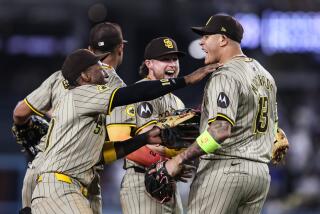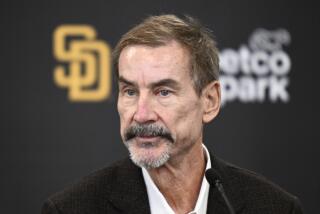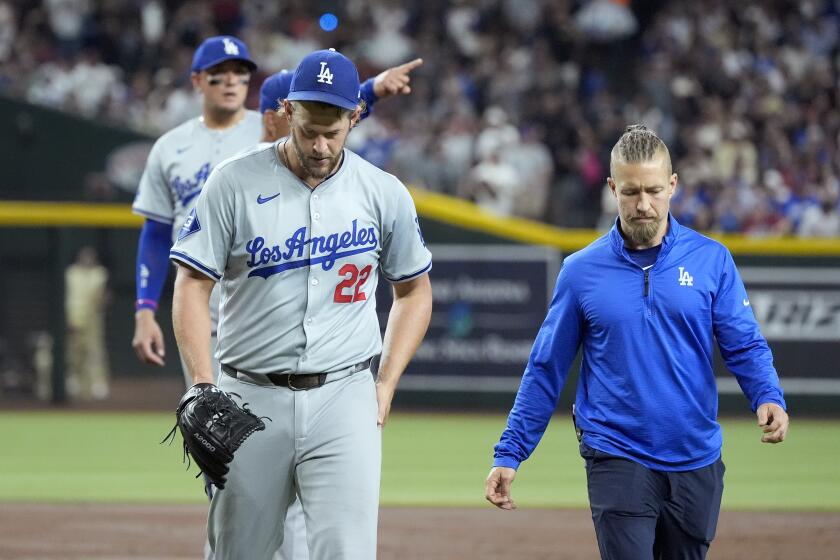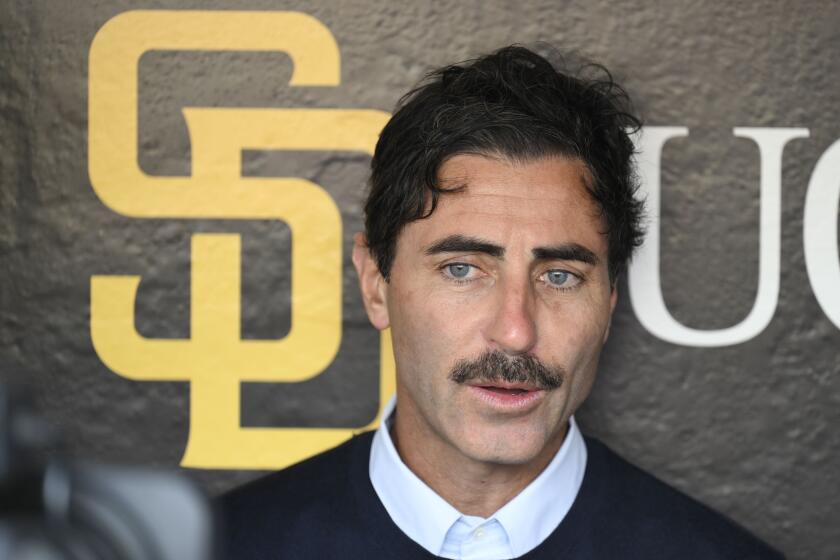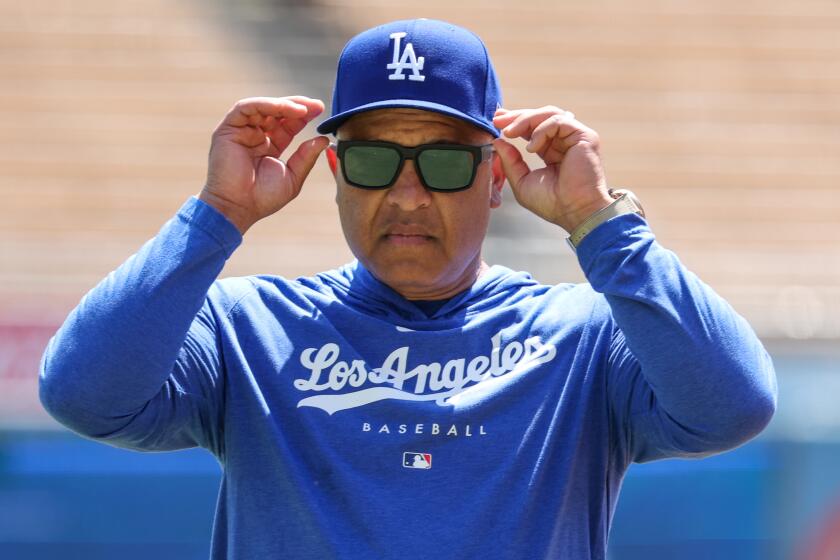Kenta Maeda has proved to be the real deal for the Dodgers
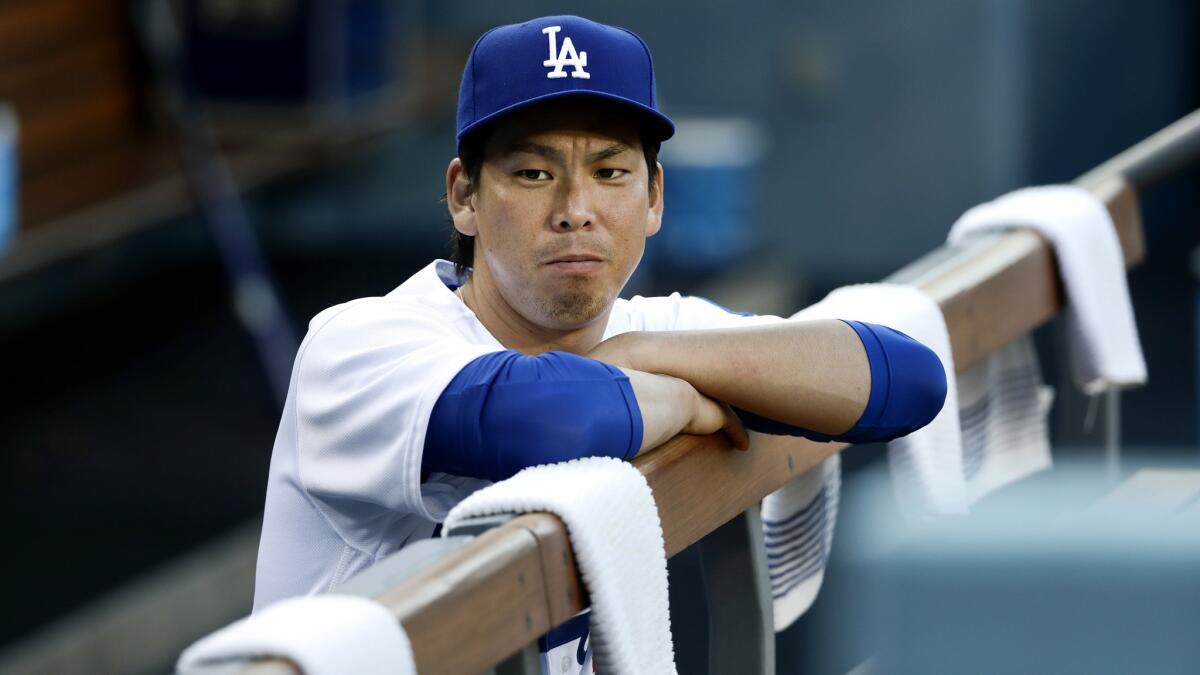
No translation is necessary when Kenta Maeda is asked what achievement he’s most proud of in his first season in the U.S. after starring for eight years in Japan.
“The home run,” the Dodgers pitcher said in English, breaking into a huge grin before interpreter Will Ireton could ask the question in Japanese.
Maeda’s solo shot in his April 6 major league debut was one of the sweeter moments of the season, the Dodgers wrapping their new teammate in a warm embrace upon his return to the dugout that night in San Diego’s Petco Park.
But a more enduring image of Maeda emerged every fifth or sixth day over the next four months, one of a steady, sturdy right-hander who has been a rock in a rotation filled with injuries and inconsistency.
Maeda enters Friday night’s start against Arizona with a 9-7 record and 3.25 earned-run average, 115 strikeouts and 32 walks in 113 2/3 innings, an average of 9.11 strikeouts and 2.53 walks per nine innings.
He hasn’t pitched as deep into games as he’d like, averaging 5 2/3 innings a start and throwing six innings or more in only 11 of 20 games, but he’s given the Dodgers a chance to win in all but perhaps one of his starts.
“I think he’s exceeded our expectations,” Manager Dave Roberts said. “You can’t expect him to be great every time out, but I think under all the circumstances, the adjustments [of going from Japan to the U.S.], Kenta has been fantastic. Every time he takes the ball, we feel good about it.”
Maeda, who pitched for the Hiroshima Carp, was a two-time winner of the Sawamura Award, given to the best pitcher in Japanese baseball. But he arrived in the U.S with medical concerns after his physical last winter showed an irregularity, believed to be in his elbow.
The condition, which Maeda asked the Dodgers not to discuss publicly, shaped negotiations for a contract that limited Maeda’s guaranteed money to $25 million over eight years but includes games-started and innings-pitched incentives that could push the deal to $100 million.
Maeda, 28, has already bumped his 2016 salary from $3 million in base pay to $5.9 million. If he starts 32 games and throws 200 innings, he would max out at $12.4 million, a good value for a mid-rotation starter.
“I don’t want to put a label on him — there’s really only a handful of No. 1 guys,” pitching coach Rick Honeycutt said. “But he’s obviously not a back-end guy. He gives you a competitive outing, and I think that’s all you can ask for. He’s been everything we anticipated, and there’s still room to get better.”
Roberts said Maeda’s durability and reliability have eased some concerns about the pitcher’s elbow.
“To see him make all of his starts … I think it’s very encouraging,” Roberts said. “He does a great job of taking care of himself.”
Does Maeda look like a pitcher who has elbow issues?
“I don’t know how to answer that — my eyes are not trained that way,” fellow starter Scott Kazmir said. “But if you were to ask me about his mechanics, I mean, they look completely sound to me. Everything about his game is, from his defense, to the way he pitches, even to the way he hits.”
Agreeing to a lengthy deal with such a low guaranteed salary and so many incentives “is a risk,” Kazmir said. “But for a guy to sign something like that, you would think his confidence in his health is high and that he’s not scared to go out there and prove himself.”
Maeda doesn’t appear to have any regrets about the deal.
“The contract itself, I can’t change,” he said through his interpreter. “What I can do is pitch and produce results. … There are times when I felt like I’ve exceeded my own expectations, but overall, looking at the season, there are definitely times when I didn’t pitch the way I wanted to. It’s a bit of both.”
The 6-foot-1, 177-pound Maeda doesn’t have overwhelming stuff, mixing a 90-mph fastball with a slider, curve and changeup. But his command and pitch-mixing approach to hitters, culled from extensive video scouting and input from coaches and catchers, have been good.
With injuries sidelining Clayton Kershaw, Hyun-Jin Ryu and Alex Wood; Julio Urias bouncing between the big leagues and triple A and Mike Bolsinger and Ross Stripling unable to hold rotation spots before the early July arrival of Bud Norris and return of Brandon McCarthy, Maeda’s consistency has been invaluable.
Opponents have hit .224 with 12 homers against Maeda, who has had success against left-handed (.226) and right-handed (.223) hitters. There is little difference between his ERA at home (3.20) and the road (3.29). His only statistical anomaly: He has a far better ERA in April (1.41) and June (2.54) than May (5.04) and July (5.14).
Maeda has adjusted from the six-man rotations of Japan to a five-man rotation. He fields his position superbly. He’s not an automatic out a the plate, with a .114 (four for 35) average, and he’s dropped six sacrifice bunts.
“What I’ve always liked about the Japanese pitchers is their competitiveness and ability to make pitches, and that’s him to a T,” Honeycutt said. “He’s in great shape, he’s a great athlete, and he’s very intelligent. … Every obstacle that’s been in front of him, he’s cleared it.”
mike.digiovanna@latimes.com
Twitter: @MikeDiGiovanna
More to Read
Are you a true-blue fan?
Get our Dodgers Dugout newsletter for insights, news and much more.
You may occasionally receive promotional content from the Los Angeles Times.
